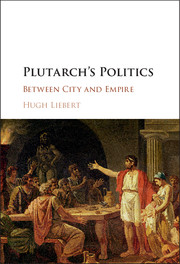
- Cited by 6
-
Cited byCrossref Citations
This Book has been cited by the following publications. This list is generated based on data provided by Crossref.
2017. Bibliography. New Surveys in the Classics, Vol. 47, Issue. , p. 173.
Shiffman, Mark 2018. Trump and Political Philosophy. p. 43.
Beck, Mark 2022. A Companion to the Political Culture of the Roman Republic. p. 159.
Goldhill, Simon 2024. The Cambridge Critical Guide to Latin Literature. p. 847.
Pettit, Philip 2025. When Minds Converse.
Edelstein, Dan 2025. Plutarch and Machiavelli: The Politics of Prudence. Political Theory, Vol. 53, Issue. 2, p. 127.
- Publisher:
- Cambridge University Press
- Online publication date:
- September 2016
- Print publication year:
- 2016
- Online ISBN:
- 9781316563120


